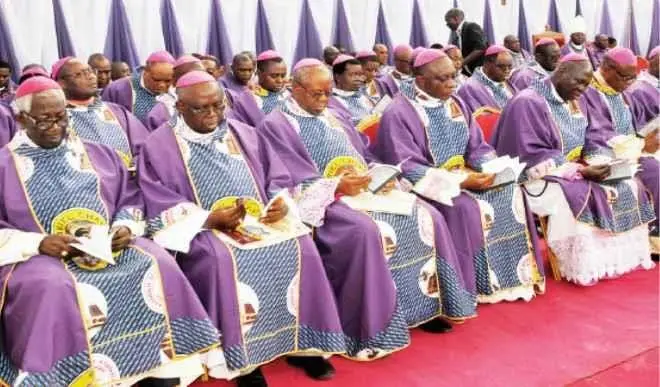Amid the lingering controversy over the judgement of the Presidential Elections Petitions Tribunal, PEPT, the Catholic Bishops’ Conference of Nigeria, CBCN, has said Nigeria currently stands on the precipice of uncertainty as the case moves to the Supreme Court.
Addressing the opening ceremony of the 2023 Second Plenary Assembly of the CBCN in Abuja yesterday, the President of the Conference, Archbishop Lucius Iwejuru Ugorji, voiced concerns over the conduct of the elections, which he said fell short of people’s legitimate expectations and moral and legal standards.
He highlighted the dismissive approach of the Presidential Election Petition Tribunal, PEPT, towards the petitions filed by aggrieved contestants.
The Catholic Bishops stated: “After hearing their petitions, the Presidential Election Petition Tribunal, PEPT, delivered its ruling in a marathon judgement on September 6, 2023.
“The five justices of the Election Petition Tribunal unanimously dismissed the petitions. According to them, they lacked merit.
“Despite the billions of naira of tax-payers money appropriated for the provision of the BVAS technology as a game-changer in our general elections, the judges in their ruling tried, among other things, to suggest that it was wrong to expect INEC to keep its promise or obey the electoral regulation of transmitting election results electronically in real time from polling units.
“While respecting the views of the judges, two of the petitioners rejected their verdict as lacking in justice and so have decided to head to the Supreme Court to seek justice.
“As this case moves to the next level, the fate of the country continues to hang in the balance and the future of democracy in our land stands on the edge of a precipice.
“We pray and hope that the Supreme Court judges will neither bend the law nor seek to satisfy the whims and caprices of any party. We also pray and hope for a day in our nation when all election results will be finally decided at the polling units and not at the court.’’
“In the face of this dismal situation, we cannot get tired of urging the government to rise to its primary responsibility of securing the lives and property of its citizens,” he stressed.
Ailing economy
Ugorji expressed deep concern over the prevailing state of tension and uncertainty in communities, where residents endure a life of increasing poverty, chronic hunger, hardships, and immense suffering.
He noted that the dire situation had been further exacerbated by the abrupt and poorly planned removal of fuel subsidy, the floating of the naira, and the subsequent galloping inflation.
The CBCN said these factors had significantly affected the prices of essential items such as food and transportation, plunging millions of Nigerians into excruciating economic hardship.
According to Archbishop Ugorji, the government’s efforts to alleviate the harsh effects of subsidy removal have not yielded significant results, leaving countless Nigerians to bear the brunt of the ruling class’s actions.
He said: “People have continued to live in a state of tension and uncertainty in our communities as they are subjected to a life of deepening poverty, chronic hunger, untold hardship and wanton suffering.”
Also speaking on the occasion, Senator Victor Umeh, who represents Anambra Central senatorial district, echoed Ugorji’s sentiments, urging those in leadership positions to consider the sufferings of the people.
“Let me speak plainly; our concern is that urgent action needs to be taken. We implore all those in positions of leadership to consider the sufferings of our people, no matter how difficult they may be. Unless compelled, they often overlook these issues.
“In the National Assembly, we are committed to supporting initiatives that promote the well-being of Nigerian citizens, despite being gravely misrepresented,” Umeh said.
Meanwhile, Archbishop Ignatius Kaigama, Catholic Archbishop of Abuja, in his homily during the plenary mass, called on Nigerians to foster peaceful coexistence and resist the temptation to engage in violence. He also urged the appropriate authorities to caution religious leaders who make inflammatory remarks in videos on social media.
Regarding regional conflicts, the Archbishop commended the wise decision to avoid engaging in a war with neighbouring Niger.
Citing the history of endless bloodshed in the region, Kaigama urged the Economic Community of West African States, ECOWAS, to recognise the plight of the people and refrain from contributing to the stories of guns, bombs, and human casualties.
“It was wise that we did not embark in a war in neighbouring Niger. War is worse than HIV, Ebola, COVID-19 and Malaria put together. ECOWAS should realize that the people of this region have seen endless bloodshed. We should be able to win peace through dialogue without firing a shot,” Kaigama said.
On his part, the President of Christian Association of Nigeria, CAN, Archbishop Daniel Okoh, expressed hope for the future of the country.
Archbishop Okoh, who was represented by Apostle Samson Fatokun, the General Secretary of CAN, said: “This plenary session is coming at a time Nigerians are still going through excruciating pains, arising from harsh economic policies, recklessness of past governments, banditry and kidnapping.
“Prices of basic necessities have skyrocketed beyond the reach of ordinary people, and there appears to be no respite in sight. The living conditions of average Nigerian families today are better imagined than experienced.
“In addition, the new wave of military coups among our close neighbours and calls from certain quarters for military action against the coupists raise fears that living conditions may worsen in our country if that option is eventually taken by the Authority of the ECOWAS Heads of Government.
“In all these, I believe that God Almighty will use faith leaders to fix this country if we do not give up. Nigeria will be great again.”
The event, chaired by Dame Adaora Umeoji, Deputy MD of Zenith Bank Plc, brought together esteemed guests such as Apostolic Nuncio, Antonio Fillipazi, deputy governors of Imo and Nasarawa states, Chief Placid Njoku and Dr Emmanuel Akabe, respectively, and Senate president, Godswill Akpabio, among others.
Umeoji, in her remarks, encouraged collaboration among the citizens, the church, and the government to reverse the current trend of hardship and insecurity.
“The World Bank classifies people living below $2 daily, approximately N1,960 per day, as poor. The implications of this classification mainly include increased inequality, poor healthcare, hunger, high mortality rates, youth unemployment, social injustice, insecurity, and social unrest.
“In light of these challenges, collaboration among citizens, the church, and the government is necessary to reverse this trend. “You (Bishops) have always provided the moral compass needed to navigate these troubled waters in which our nation has been sailing for many decades,” she stated.

